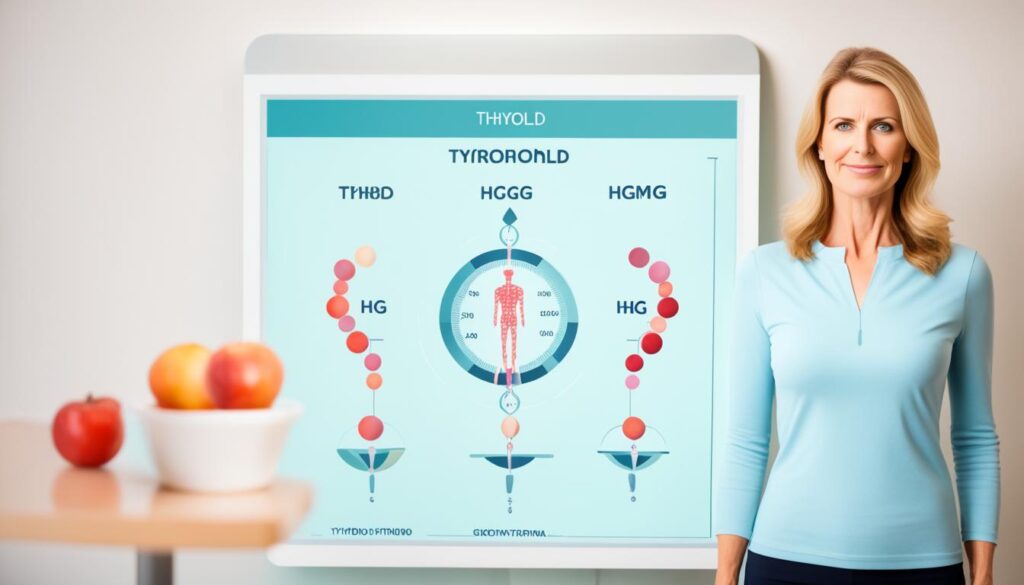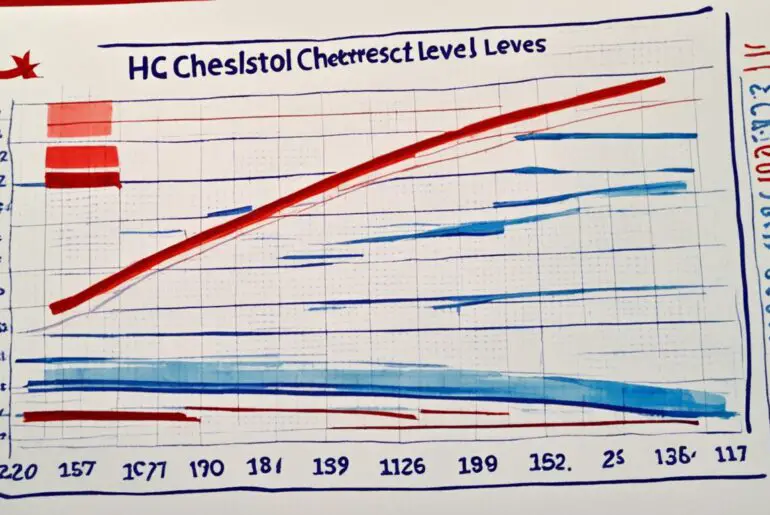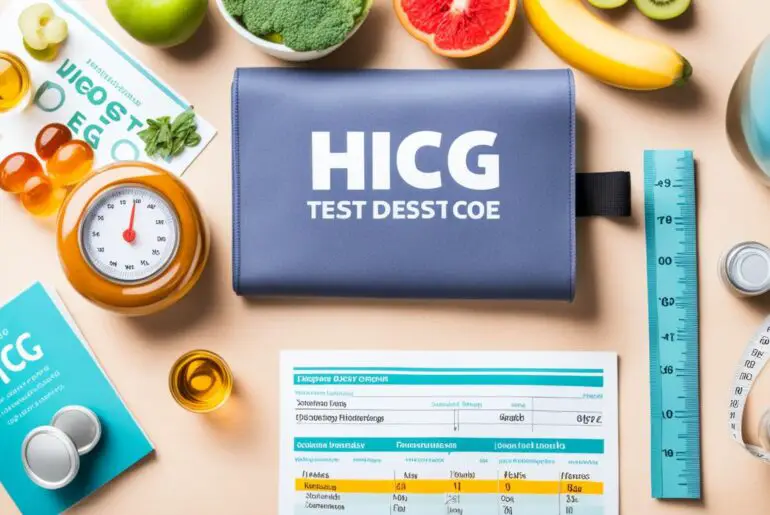Have you ever wondered about the impact of the HCG diet on thyroid function? Does it really live up to its promises in terms of weight loss while keeping the thyroid health intact? It’s time to separate fact from fiction and delve into the truth behind the HCG diet and its effects on thyroid function.
The HCG diet has gained popularity as a quick and effective weight loss method. The diet involves a combination of a severely restricted calorie intake and the injection of human chorionic gonadotropin (hCG) hormone. While the HCG diet may offer rapid weight loss, it also comes with potential risks that can impact your thyroid health.
Thyroid function is crucial for regulating metabolism, energy levels, and overall well-being. Any disruption to the delicate balance of thyroid hormones can negatively affect your body’s ability to function optimally. This leads us to question whether the HCG diet, with its extreme calorie restriction and hormone injections, can potentially disrupt thyroid function and even worsen existing thyroid problems.
Join me as I explore the relationship between the HCG diet and thyroid health, uncovering the hidden risks and shedding light on the impact of this controversial weight loss method.
Key Takeaways:
- The HCG diet can have a significant impact on thyroid function, potentially leading to complications and worsening existing thyroid problems.
- The injection of hCG hormone in the HCG diet can stimulate thyroid follicular epithelium and contribute to acute inflammatory responses.
- Fine needle aspiration (FNA) during thyroid evaluation can result in complications such as thyroid swelling and thyroiditis.
- The HCG diet’s calorie restriction can reduce metabolism and resting energy expenditure, leading to metabolic damage and potential hormone imbalances.
- Differentiating between the HCG diet and the HCG hormone can help understand their respective impacts on thyroid function and metabolic health.
The Role of hCG Injections in Thyroid Function
hCG injections, commonly used in the HCG diet, play a significant role in thyroid function. These injections have been found to potentially stimulate the thyroid follicular epithelium through cross-reactivity with the thyroid-stimulating hormone (TSH) receptor. The stimulation of the thyroid follicular epithelium can contribute to the acute inflammatory response that occurs after fine needle aspiration of the thyroid.
“hCG injections have the ability to interact with the TSH receptor, leading to an activation of the thyroid follicular epithelium. This interaction can trigger an inflammatory response in the thyroid, which may result in various thyroid-related complications.”
The exact relationship between hCG injections and thyroid function is not fully understood, and further research is needed to determine the extent of their impact on thyroid health. However, it is evident that hCG injections have the potential to modulate thyroid function through their action on the thyroid follicular epithelium and the TSH receptor.
Thyroid Function and Fine Needle Aspiration

Fine needle aspiration (FNA) is a common procedure used to evaluate thyroid nodules for potential malignancy. While FNA is an important diagnostic tool, it is essential to be aware of the potential complications it can cause, such as thyroid swelling and thyroiditis.
During the FNA procedure, the release of thyroglobulin, thyroid hormone stores, and cytokines can trigger symptoms of thyrotoxicosis, leading to pain, tenderness, and inflammation in the thyroid area. These symptoms can be distressing for patients and require careful management.
The risk of developing thyroiditis following FNA can be influenced by factors such as the size and characteristics of the nodule, as well as the size of the needle used during the procedure. Larger nodules and the use of larger needles may increase the likelihood of post-FNA thyroiditis.
Furthermore, pregnancy and elevated levels of hCG have been suggested as potential risk factors for post-FNA thyroiditis. However, more research is needed to fully understand the associations between these factors and the development of thyroid inflammation after FNA.
Complications of Fine Needle Aspiration
Fine needle aspiration can lead to complications such as:
- Thyroid swelling
- Thyroiditis
Thyroid swelling can cause discomfort and may require further evaluation and management. Thyroiditis, on the other hand, can result in inflammation of the thyroid tissue and may lead to symptoms such as pain, tenderness, and changes in thyroid hormone levels.
Risk Factors for Post-FNA Thyroiditis
Several factors may increase the risk of developing thyroiditis after FNA:
- Nodule size and characteristics
- Needle size used during the procedure
- Pregnancy
- Elevated levels of hCG
Understanding these risk factors can help healthcare professionals identify individuals who may be more susceptible to post-FNA thyroiditis and provide appropriate care and monitoring.
It is crucial to recognize the potential complications of fine needle aspiration and take necessary precautions to ensure patient safety. Close monitoring and prompt management of symptoms are essential to minimize the impact of these complications on thyroid health.
Dissecting the HCG Diet and Thyroid Health
The HCG diet, known for its calorie restriction, can have a significant impact on thyroid health. When we restrict calories, our energy expenditure and resting metabolic rate decrease, leading to an overall reduction in metabolism. This decrease in metabolism can contribute to metabolic damage and dysfunction of the thyroid gland. It’s worth noting that the HCG diet may not address the underlying hormonal abnormalities that contribute to weight gain, which can result in weight regain once the diet is completed. Therefore, it is crucial to have a comprehensive understanding of thyroid function and the factors that play a role in weight loss and weight loss maintenance before considering the HCG diet as a weight loss method.
“Calorie restriction affects energy expenditure and metabolism, potentially resulting in thyroid dysfunction and metabolic damage.”
The Impact of Calorie Restriction on Thyroid Function
Calorie restriction has a direct impact on our thyroid function. Our thyroid plays a crucial role in regulating our metabolism by producing hormones that control our body’s energy expenditure. However, when we significantly reduce calorie intake, our body perceives it as a form of starvation, leading to a decrease in thyroid hormone production. This reduction in thyroid hormone levels slows down our metabolism and makes it harder for our body to burn calories, ultimately impeding weight loss efforts.
Reduced Metabolism and Thyroid Damage
One of the key consequences of calorie restriction in the HCG diet is a reduced metabolism. With a decrease in energy expenditure, our body starts to conserve energy and reduce overall metabolic activity. This metabolic slowdown can have long-term effects on our thyroid function, as the thyroid relies on an optimal metabolic rate to maintain proper hormone production and regulation. Prolonged calorie restriction can impair thyroid function, leading to hormonal imbalances and potentially damaging the thyroid gland.
Thyroid Function and Weight Loss Maintenance
Proper thyroid function is essential not only for weight loss but also for weight loss maintenance. The thyroid hormones play a crucial role in regulating our body weight and metabolism. When our thyroid function is compromised, it becomes harder for us to maintain weight loss achieved through calorie restriction. This is why it is essential to focus on optimizing thyroid health when embarking on any weight loss journey, including the HCG diet.
| Impact of HCG Diet on Thyroid Health | Actions to Support Thyroid Function |
|---|---|
| Reduces metabolism and resting energy expenditure | Work with a healthcare professional knowledgeable about thyroid function to monitor hormone levels |
| May not address underlying hormonal abnormalities contributing to weight gain | Support overall thyroid health through proper nutrition, supplementation, and lifestyle choices |
| Potentially leads to weight regain after completing the diet | Prioritize thyroid health and seek professional guidance before considering the HCG diet as a weight loss method |
It’s crucial to approach the HCG diet with a comprehensive understanding of how it can affect thyroid health. Working with a healthcare professional who specializes in thyroid function can ensure proper monitoring and support throughout the diet. Prioritizing thyroid health and addressing any underlying hormonal imbalances are key to achieving long-term weight loss maintenance.
The HCG Diet vs. HCG Hormone
When discussing the HCG diet and HCG hormone, it is important to understand the key differences between the two. While both are associated with weight loss and hormonal regulation, they have distinct mechanisms and potential effects on the body.
Differentiating between HCG Diet and HCG Hormone
The HCG diet is a weight loss program that involves a very low-calorie diet combined with injections or supplements of HCG hormone. The primary focus of the diet is on calorie restriction, typically ranging from 500 to 800 calories per day. This severe calorie restriction can lead to rapid weight loss, but it may also have negative impacts on thyroid function and metabolism.
On the other hand, HCG hormone therapy involves the use of HCG hormone without the restrictive calorie intake. HCG hormone, typically administered through injections or oral drops, has been used in various medical contexts, including fertility treatments and hormone regulation. When used without the calorie restriction aspect, HCG hormone therapy may offer potential benefits for thyroid function and metabolic balance.
Potential benefits of HCG Hormone
HCG hormone has shown potential benefits in stimulating thyroid function and increasing the release of thyroid hormones. This can be particularly valuable for individuals with thyroid imbalances or suboptimal thyroid function. By promoting thyroid activity, HCG hormone therapy may help regulate metabolism, maintain energy levels, and support overall hormone balance.
HCG Hormone and thyroid function
The HCG hormone has direct effects on the thyroid gland by stimulating the release of thyroid hormones. This activity can enhance thyroid function and potentially improve symptoms associated with suboptimal thyroid activity, such as fatigue, weight gain, and mood changes. It is important to note that the specific mechanisms through which HCG hormone affects the thyroid are still being studied, and more research is needed to fully understand the extent of these effects.
HCG Hormone and metabolic function
In addition to its impact on thyroid function, HCG hormone may also play a role in metabolic regulation. Some studies suggest that HCG hormone therapy can boost metabolic rate and help maintain lean body mass during weight loss. By supporting metabolic function, HCG hormone may assist in weight management and prevent the metabolic damage that can occur with extreme calorie restriction.
“HCG hormone therapy offers potential benefits for thyroid function regulation and metabolic balance, with the exclusion of severe calorie restriction associated with the HCG diet.”
| Aspect | HCG Diet | HCG Hormone |
|---|---|---|
| Calorie Intake | Severely restricted, typically 500-800 calories per day | Varies depending on individual needs, no specific calorie restriction |
| Potential Effects on Thyroid Function | Negative impact due to severe calorie restriction | Potentially beneficial, may stimulate thyroid function |
| Metabolic Regulation | Reduces metabolism and resting energy expenditure due to low-calorie intake | May support metabolic rate and weight management |
| Safety Concerns | Risks associated with severe calorie restriction and potential metabolic damage | Relatively safe when used under medical supervision |
It is crucial to consult with a healthcare professional before considering either the HCG diet or HCG hormone therapy. They can provide guidance on which approach may be more suitable for your specific needs and health status. Additionally, medical supervision is essential to minimize potential risks and ensure a safe and effective weight loss journey.
The Impact of HCG Diet on Metabolism and Resting Energy Expenditure

The HCG diet has a significant impact on metabolism and resting energy expenditure. Studies have shown that this diet, which involves consistent calorie restriction, can lead to a substantial decrease in metabolism by up to 40% in as little as 21 days. The reduction in energy expenditure caused by the HCG diet can result in metabolic damage and pose challenges in maintaining weight loss.
Calorie restriction alone is not an effective long-term weight loss solution. It fails to address the underlying hormonal abnormalities that contribute to weight gain. While the HCG diet may initially lead to weight loss, the method does not holistically address energy balance and may cause disruptions to metabolic and hormonal functions.
To illustrate the impact of the HCG diet on metabolism and energy balance, consider the following comparison:
| Calorie Restriction Only | HCG Diet |
|---|---|
| Reduces metabolism by up to 40% | Reduces metabolism by up to 40% |
| Does not address hormonal abnormalities | Does not address hormonal abnormalities |
| Inadequate for long-term weight loss maintenance | Inadequate for long-term weight loss maintenance |
| Potential metabolic damage | Potential metabolic damage |
As demonstrated by the comparison, the HCG diet and calorie restriction alone yield similar results and limitations in terms of reducing metabolism and addressing hormonal imbalances, making them both inadequate for sustainable weight loss and management.
It’s important to consider the potential impact of the HCG diet on metabolism and resting energy expenditure before deciding to pursue this weight loss method. Prioritizing an approach that promotes healthy energy balance and addresses underlying hormonal factors is crucial for long-term success.
Potential Side Effects of the HCG Diet
The HCG diet may result in various side effects that can impact thyroid and metabolic function. These side effects include:
- Metabolic damage: The calorie restriction component of the HCG diet can lead to a decreased resting metabolic rate, resulting in a slower metabolism.
- Thyroid dysfunction: The HCG diet has been associated with reduced thyroid function, characterized by elevated reverse T3 levels and low free T3 levels. This can disrupt the normal functioning of the thyroid gland.
- Hormonal imbalances: The HCG diet has the potential to lower progesterone levels, leading to estrogen dominance. This hormonal imbalance can have various effects on the body.
- Other symptoms: Individuals following the HCG diet may experience hair loss, weight gain, and changes in mood or emotional well-being.
These side effects are often a consequence of the strict calorie restriction imposed by the HCG diet. They can have long-lasting implications for overall health and well-being. Therefore, it is crucial to consider these potential side effects before embarking on the HCG diet.
Table:
| Side Effects of the HCG Diet |
|---|
| Metabolic damage |
| Thyroid dysfunction |
| Hormonal imbalances |
| Other symptoms (hair loss, weight gain, mood changes) |
It is important to be aware of these potential side effects and their impact on thyroid and metabolic health before deciding to undertake the HCG diet. Consulting with a healthcare professional who can provide guidance and support throughout the diet is highly recommended.
Addressing the Thyroid Impact of the HCG Diet

While following the HCG diet, it is crucial to be mindful of the potential impact on thyroid function. Fortunately, there are steps that can be taken to manage and support thyroid health during the diet. By working closely with a knowledgeable healthcare professional, monitoring thyroid hormone levels, and making necessary adjustments, you can ensure optimal thyroid function throughout the diet journey.
Supporting overall thyroid health is equally important. This can be achieved through proper nutrition, supplementation, and lifestyle choices. Incorporating thyroid-friendly foods such as seafood, seaweed, and Brazil nuts, which are rich in essential nutrients like iodine and selenium, can help prevent thyroid damage and maintain healthy thyroid function.
Preventing thyroid damage during HCG diet:
- Work with a healthcare professional to monitor thyroid hormone levels
- Adjust the HCG diet protocol, if necessary, to support thyroid function
- Incorporate thyroid-friendly foods into your diet
- Avoid excessive calorie restrictions that may negatively impact thyroid health
In addition to proper nutrition, specific thyroid supplements can also aid in supporting thyroid function during the HCG diet. Consult with your healthcare professional to determine if any thyroid supplements are suitable for your individual needs.
Remember, prioritizing thyroid health is crucial when considering the HCG diet as a weight loss method. Seek professional guidance and take proactive steps to support your thyroid function throughout your HCG diet journey.
| Steps to support thyroid function during the HCG diet |
|---|
| Work with a healthcare professional |
| Monitor thyroid hormone levels |
| Make necessary adjustments to the HCG diet |
| Incorporate thyroid-friendly foods into your diet |
| Consider thyroid supplements, if recommended by a healthcare professional |
Conclusion
In conclusion, the HCG diet can have significant implications for thyroid function and overall metabolic health. The injection of hCG for weight loss, a key component of the HCG diet, has been found to potentially stimulate the thyroid follicular epithelium and contribute to thyroid swelling and inflammation. Additionally, calorie restriction during the HCG diet can lead to reduced metabolism and resting energy expenditure, potentially causing long-term damage to the thyroid and hormonal imbalances.
Before embarking on the HCG diet, it is essential to consider the potential risks and complications associated with its impact on thyroid function. Consulting with a healthcare professional who specializes in thyroid health is crucial to assess thyroid function and determine if the HCG diet is a suitable weight loss method. With proper guidance, steps can be taken to support thyroid health during the diet, such as regular monitoring of thyroid hormone levels and adopting a comprehensive approach that includes proper nutrition and supplementation.
It is important to note that the long-term effects of the HCG diet on thyroid function have not been extensively studied. More research is needed to fully understand the implications and potential risks associated with the HCG diet. In the meantime, considering alternative weight loss methods that prioritize overall health and well-being may be a more prudent approach. Making informed decisions and prioritizing thyroid health are essential for achieving sustainable weight loss and maintaining overall health.
FAQ
Does the HCG diet have an impact on thyroid function?
Yes, studies have shown that the HCG diet can have an impact on thyroid function, potentially leading to thyroid growth, thyrotoxicosis, and subsequent hypothyroidism.
How do hCG injections affect thyroid function?
hCG injections can potentially stimulate thyroid follicular epithelium through cross-reactivity with the thyroid-stimulating hormone (TSH) receptor, contributing to acute inflammatory responses and thyroiditis.
Can fine needle aspiration (FNA) affect thyroid function?
Yes, FNA can lead to complications such as thyroid swelling and thyroiditis, triggered by the release of thyroglobulin, thyroid hormone stores, and cytokines during the procedure.
What are the potential risks of the HCG diet on thyroid and metabolic health?
The HCG diet can reduce metabolism and resting energy expenditure, leading to metabolic damage, hormone imbalances, and potential long-term effects on thyroid function.
Is there a difference between the HCG diet and the HCG hormone?
Yes, the HCG diet is a calorie-restricted diet that can have negative effects on thyroid and metabolic function, while the HCG hormone on its own has shown potential benefits for thyroid function and hormone balance.
How does calorie restriction on the HCG diet affect metabolism?
Calorie restriction on the HCG diet can reduce metabolism and resting energy expenditure, potentially leading to metabolic damage and difficulties in maintaining weight loss.
What are the potential side effects of the HCG diet on thyroid and metabolic function?
The HCG diet can lead to metabolic damage, reduced thyroid function, elevated levels of reverse T3, and hormonal imbalances, resulting in symptoms such as weight gain, hair loss, and mood changes.
How can I support thyroid health while on the HCG diet?
Working with a healthcare professional who understands thyroid function, monitoring hormone levels, and supporting overall thyroid health through proper nutrition and lifestyle choices can help mitigate the impact of the HCG diet on thyroid function.
What should I consider before starting the HCG diet?
It is important to be aware of the potential risks and side effects of the HCG diet on thyroid function and metabolism. Consulting with a healthcare professional and considering alternative weight loss methods may be beneficial.
What are the conclusions regarding the impact of the HCG diet on thyroid function?
The HCG diet can have negative implications for thyroid function, and more research is needed to fully understand the long-term effects. It is important to prioritize thyroid health and seek professional guidance when considering the HCG diet as a weight loss method.




